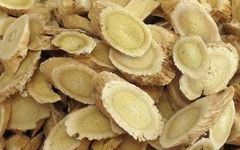Disease Inquiry, Health Guidance, Classic Health Preservation, No Need to Seek Help When Sick
Astragalus, also known as Huang Qi (黄芪), has a sweet and slightly warm nature, and it belongs to the Lung (Fei) and Spleen (Pi) meridians. It has the functions of tonifying Qi and raising Yang, benefiting the Wei (defensive) Qi and consolidating the exterior, expelling toxins and promoting tissue regeneration, as well as promoting urination and reducing swelling. However, due to its warm nature, it can assist Yang and promote fire, and if used improperly, it may easily lead to Yin injury and fluid depletion or exacerbate pathogenic factors.
Widely Used, Based on Syndrome Differentiation
Based on the experiences of predecessors and through long-term clinical practice, the twelve major functions of Astragalus have been summarized according to syndrome differentiation.
1. Benefit the Lungs
Astragalus is slightly warm and enters the Lung meridian. Both ancient and modern physicians regard it as a key herb for tonifying Lung Qi.
It is mainly used for conditions of Lung Qi deficiency, reduced defensive function, and invasion by external pathogens, such as colds, rhinitis, and cough with wheezing.
Due to its ability to enhance the body’s immune function, inhibit abnormal immune responses, and improve disease resistance, it is particularly effective for conditions like allergic rhinitis, urticaria, bronchial asthma, and eczema, which are associated with low normal immunity and abnormal diseases.
Syndrome differentiation points: recurrent skin rashes or susceptibility to colds, runny nose, cough with wheezing, shortness of breath, and low voice.
2. Tonify the Middle
Astragalus belongs to the Spleen meridian, has a sweet flavor that nourishes the Earth, and its warm nature promotes transformation, making it the first choice for tonifying the Middle and nourishing the Earth.
Clinically, it is widely used for Spleen and Stomach deficiency, with abnormal transformation leading to stomach pain, diarrhea, vomiting, and other Spleen-Stomach disorders.
Because it nourishes the organs and has a strengthening effect, it can adjust and promote gastrointestinal function, thus having excellent efficacy for digestive tract diseases.
Syndrome differentiation points: digestive system diseases accompanied by fatigue, abdominal distension, poor appetite, and loose stools.
3. Raise Yang
Astragalus is warm in nature, with a light and uplifting Qi that is good at raising Yang Qi, mainly used for conditions of Yang Qi sinking, inability to uplift, and the failure to transport the essence of food and fluids to nourish the organs, leading to organ prolapse.
From the perspective of modern pharmacological research, it contains various nutrients that strengthen the body and promote organ function, thus having certain efficacy for conditions like gastric prolapse, renal prolapse, and uterine prolapse.
Syndrome differentiation points: examination reveals various organ prolapses accompanied by fatigue, preference for warmth and pressure, thin physique, and weak pulse.
4. Promote Urination
Astragalus tonifies the Middle, normalizing the central pivot, allowing for upward and downward communication, warming Yang and benefiting Qi, thus promoting the flow of the three Jiaos (upper, middle, and lower) and facilitating urination.
It is mainly used for Qi deficiency, abnormal fluid metabolism, and Yang deficiency that cannot transform Qi and move fluids, such as acute and chronic nephritis, mucinous edema, idiopathic edema, liver-related and heart-related edema, etc. It is particularly effective as Astragalus has a significant diuretic effect and can accelerate the disappearance of urinary protein, protect the liver, and prevent the reduction of liver glycogen, thus being effective for nephritis and liver-related edema.
Syndrome differentiation points: edema with pale skin, indentation upon pressure, fatigue, cold limbs, preference for warm drinks, and loose stools.
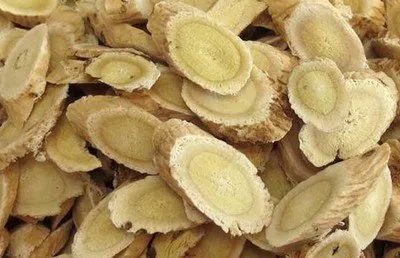
5. Warm Yang
Astragalus is warm in nature and has a strong ability to warm and tonify the original Yang, especially effective in warming and tonifying Heart Yang, mainly used for conditions of Heart Yang deficiency, inability to promote blood circulation, palpitations, chest obstruction, and Heart-related edema.
This is because Astragalus can enhance myocardial contractility, improve heart function, and has a significant cardiotonic effect.
Syndrome differentiation points: palpitations, chest tightness or pain, cold limbs, purple lips, and irregular pulse.
6. Expel Toxins (Promote Tissue Regeneration)
The “Shennong Bencao Jing” states that Astragalus “is used for chronic sores and abscesses, expelling pus and relieving pain.” It has been referred to as the “key herb for sores” and is often used for sores and abscesses caused by Qi and blood deficiency, where pus forms but does not drain or does not heal after rupture, as well as for skin and digestive tract mucosal lesions such as peptic ulcers, chronic gastritis, oral ulcers, ulcerative colitis, Behçet’s disease, and skin diseases that do not heal after ulceration.
This is because Astragalus can enhance the phagocytic function of the reticuloendothelial system and has inhibitory effects on cocci and bacilli, thereby enhancing local disease resistance and promoting the healing of local lesions.
Syndrome differentiation points: internal and external ulcers that do not heal for a long time, accompanied by fatigue, pale complexion, thin physique, pale tongue, and weak pulse.
7. Activate Blood Circulation
Astragalus is warm and good at promoting circulation, benefiting Qi and warming Yang, stimulating blood flow, and thus has a significant effect on activating blood circulation. Clinically, it is mainly used for various conditions caused by blood stasis in the brain, such as transient ischemic attacks, vertebrobasilar insufficiency, and cerebral arteriosclerosis, leading to dizziness, headaches, and hemiplegia from stroke.
Modern pharmacological studies have shown that it can stimulate the central nervous system, improve blood circulation, and promote the recovery of brain cell function, thus treating ischemic brain diseases.
Syndrome differentiation points: headaches, dizziness, hemiplegia, accompanied by numbness of the limbs, purple lips and tongue, and weak, thin pulse.
8. Consolidate and Control
Astragalus, due to its strong Qi tonifying ability, has a good consolidating and controlling effect, able to control the leakage of blood and body fluids.
It is commonly used for bleeding and excessive loss of body fluids due to Qi and blood deficiency, such as chronic bleeding from organs, diabetes insipidus, nocturnal emissions, spermatorrhea, spontaneous sweating, and night sweats.
Modern pharmacological studies have shown that the components in Astragalus, such as glucuronic acid and various amino acids, have strengthening effects and can replenish the protein components lost due to spontaneous sweating, as well as block skin secretion pores to inhibit excessive sweating, thus having a stopping sweat effect.
Syndrome differentiation points: various chronic bleeding, night sweats, spontaneous sweating, frequent urination, nocturnal emissions, accompanied by pale complexion, fatigue, poor appetite, pale tongue, and weak pulse.
9. Generate Blood
The “Bencao Gangmu” states, “Astragalus is sweet, warm, and purely Yang, with five uses, including… activating blood and generating blood…”
It is commonly used for blood deficiency syndromes caused by various reasons, such as anemia from various causes, and decreased blood cells after chemotherapy for malignant tumors.
This is because Astragalus can promote the proliferation of normal precursor cells in the bone marrow, and the folic acid contained in Astragalus is essential for red blood cell synthesis, thus Astragalus can generate and nourish blood.
Syndrome differentiation points: pale complexion, palpitations, dizziness, fatigue, pale lips and tongue, and weak, thin pulse.
10. Quench Thirst
The “Bielu” states that Astragalus “supplements the deficiencies of men, alleviates the five labors and emaciation. It quenches thirst, alleviates abdominal pain, diarrhea, and benefits Qi and Yin Qi.” Clinically, it is used to treat the weight loss and thirst associated with diabetes, and it has certain efficacy, because Astragalus can adjust the immune state of the body, inhibit abnormal immune responses of the pancreas, and lower blood sugar.
Syndrome differentiation points: weight loss, thirst, dry mouth, cold intolerance, pale tongue, white coating, and thin pulse.
11. Induce Sweating
Astragalus can benefit Qi and nourish blood while promoting Yin Qi, and it can also elevate Yang Qi, thus it can supplement the sweat source to induce sweating.
Clinically, it is often used for Qi and blood deficiency, external invasion of wind-cold, and conditions where sweating cannot occur due to imbalance of Qi, blood, Yin, and Yang, as well as dysfunction of sweat glands, such as in cases of body weakness with colds, autonomic nervous dysfunction, and Sjögren’s syndrome.
Syndrome differentiation points: severe chills, fever without sweating, fatigue, dry mouth, dry skin, cold limbs without sweating, and thin pulse.
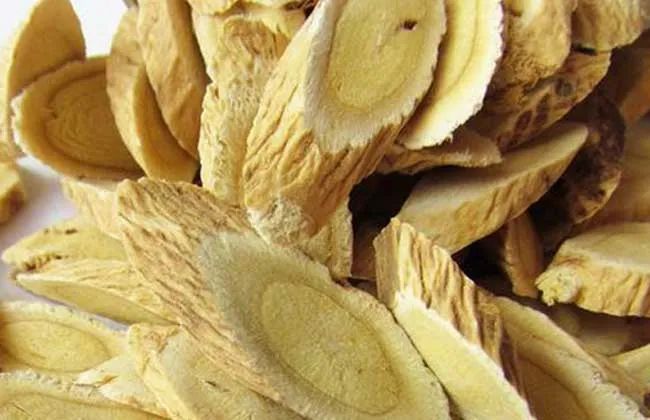
12. Disperse Bi (Pain)
Astragalus is warm in nature, travels and does not stay, reaching both inside and outside, can warm the meridians, activate blood, and unblock collaterals, thus having the effect of dispelling wind, scattering cold, and eliminating dampness. Clinically, it is widely used for various wind-cold-damp Bi syndromes, such as various types of arthritis pain, muscle pain, and neuralgia due to Qi and blood deficiency, invasion of wind-cold-damp evil, and blood stasis obstructing the collaterals.
Syndrome differentiation points: muscle and joint swelling and pain, numbness accompanied by weakness and fatigue, cold limbs that feel better with warmth, pale tongue with white coating, and deep, thin, weak pulse.
Clinical Application, Focus on Compatibility
In my clinical practice, I find that Astragalus is good at being combined with other herbs to enhance efficacy.
For example, when using it for activating blood, it is often combined with leeches in a 10:1 ratio to enhance its Qi tonifying and blood activating effects;
for benefiting the lungs, it is commonly paired with Fang Feng (防风) to benefit the lungs while dispersing wind and consolidating the exterior without leaving pathogens, which is effective for lung-related diseases and chronic skin diseases;
for tonifying the Middle, it is often combined with Huai Shan (淮山), which complements Qi tonifying and Yin nourishing, invigorating the Spleen and benefiting Spleen Yin;
when used to raise Yang, it is paired with Sheng Ma (升麻), enhancing its Qi tonifying and Yang raising effects, promoting the upward movement of the essence of food and fluids to nourish the organs;
for promoting urination, it is often combined with Han Fang Ji (汉防己), where Astragalus focuses on raising while Fang Ji focuses on lowering, thus complementing each other to enhance Qi tonifying and diuretic effects;
for warming Yang, it is often paired with Fu Zi (附子), where Astragalus enters the Lung and Spleen to benefit Qi and warm Yang, while Fu Zi enters the Heart and Kidney to greatly tonify original Yang, making it widely applicable for various Yang deficiency conditions;
for generating blood, it is combined with Dang Gui (当归) in a 5:1 ratio, as Dang Gui specializes in blood tonification, thus ensuring that sufficient blood can carry Qi, and abundant Qi can generate blood, greatly enhancing the effects of Qi tonification and blood generation;
for expelling toxins, it is often paired with Pu Gong Ying (蒲公英), which helps to support the righteous Qi while expelling evil, promoting the healing of sores;
for quenching thirst, it is often combined with Tian Hua Fen (天花粉), which uses both cold and warm properties to warm Yang, nourish Yin, generate fluids, and quench thirst, enhancing the blood sugar-lowering effect, specifically treating diabetes;
for consolidating and controlling, it is often paired with Ma Huang Gen (麻黄根), which strongly benefits Qi and consolidates the exterior to stop sweating, specifically treating Qi deficiency with spontaneous sweating;
for inducing sweating, it is often combined with exterior-releasing herbs to promote sweating in cases of body weakness with colds;
if paired with Xuan Shen (玄参) to balance Yin and Yang and replenish the sweat source, it is specifically used for autonomic nervous dysfunction and Sjögren’s syndrome;
for dispersing Bi, it is well paired with Xi Xin (细辛), as both herbs work together to enhance the ability to unblock collaterals, synergistically stimulating the Yang Qi inside and outside, supporting the righteous Qi while expelling evil, specifically treating wind-cold-damp Bi.
Using reasonable combinations can enhance the various therapeutic effects of Astragalus.
Who Should Not Use Astragalus
Although Astragalus is beneficial, it is still a medicinal material, and improper use can easily lead to abdominal distension and excessive gas.
Therefore, before using Astragalus, you must conduct a self-test.
Test 1: Recall if you are prone to sweating.
If you sweat easily under normal activity levels, it indicates Qi deficiency, making Astragalus more suitable for you.
Test 2: Assess your immunity.
Immunity is the body’s self-defense mechanism. If you meet three or more of the following seven criteria, it indicates that your immunity is relatively low, and Astragalus is suitable for you.
1. Are you often weak and fatigued?
2. Do you prefer quiet and feel lazy to talk?
3. Is your appetite reduced, leading to malnutrition?
4. Do you catch colds at least four times a year?
5. Do you seek injections or medications for minor ailments?
6. Do you take a long time to recover from illnesses, and do they often recur?
7. Do you spend most of your time in an environment with air conditioning or heating?
Test 3: Observe your tongue.
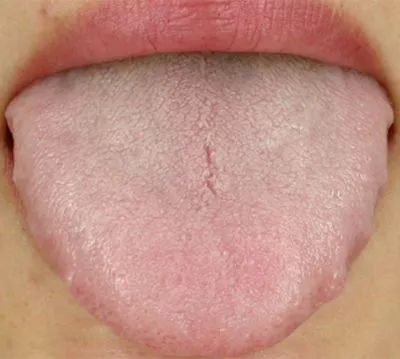
If you look in the mirror and see a thin coating on your tongue with teeth marks on the sides, it indicates that you may have some degree of Qi deficiency.
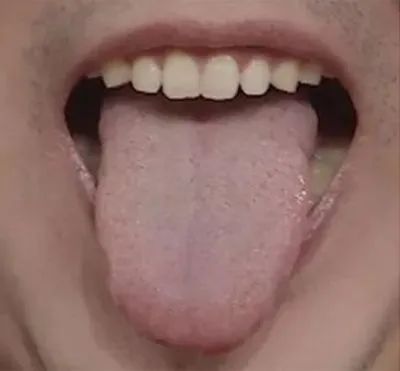
Note: Individuals with heavy dampness may have a thick and greasy tongue coating, and using Astragalus may easily obstruct Qi movement, worsening discomfort. Therefore, those with phlegm-damp constitution are not suitable for consuming Astragalus alone.
Manifestations of heavy dampness: feeling of heaviness in the body, loss of appetite, abdominal distension, sticky stools, and thick greasy tongue coating.
Additionally, those with Yin deficiency, heat syndrome, or Qi stagnation should also avoid using Astragalus.
Correct Use of Astragalus
1. Astragalus and Jujube Tea
Ingredients: 30g Astragalus, 7 Jujubes, 3g Chen Pi (陈皮)
Jujube nourishes Qi and blood, and Chen Pi regulates Qi and alleviates stagnation. Long-term consumption is beneficial for those with low immunity.
2. Astragalus and Hawthorn Drink
Ingredients: 20g Astragalus, 10g Hawthorn, 400ml water.
Method: Rinse Astragalus and Hawthorn with cold boiled water, then place them in a thermos and pour boiling water over them. After half an hour, it can be consumed. After finishing, more boiling water can be added for further brewing.
Astragalus tonifies Qi, and Hawthorn activates blood. The combination is especially suitable for patients with Qi deficiency-type heart disease and those with hypertension.
3. Astragalus Spleen Nourishing Porridge
Ingredients: 15g roasted Astragalus, 50g rice, 3g Chen Pi.
Method: Soak the rice for half an hour in advance, and soak the roasted Astragalus in 450g of water for half an hour.
Pour the Astragalus and water into a pot, bring to a boil over high heat, then reduce to low heat and simmer for 10 minutes. Strain out the Astragalus water, add more water, bring to a boil again, simmer for another 10 minutes, remove the Astragalus, and pour the first boiled Astragalus water back into the pot.
Once boiling, add the rice and a small amount of oil, and cook until boiling again, then add the Chen Pi powder and cook for 25 minutes.
4. Astragalus Qi Tonifying Tea
Ingredients: 10g each of American Ginseng, Goji Berries, and Astragalus.
Method: The above herbs can be boiled in water for a day’s worth.
This tea benefits Qi, nourishes Yin, clears heat, reduces fire, eliminates fatigue, and enhances immunity, making it suitable for those who often stay up late.
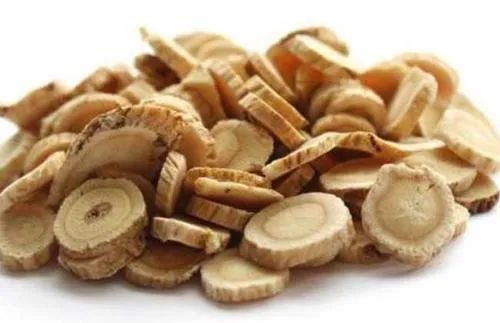
5. Astragalus Water Spray for the Room
The famous TCM expert Mr. Guan Youbo has used this method in clinical practice. Take 120g of Astragalus, boil it in water, and then spray it in the room. The medicinal effects of Astragalus can be absorbed through breathing and skin, suitable for those with severe Qi deficiency and body weakness.
Pay Attention to Contraindications and Dosage for Effectiveness
When using Astragalus, it is essential to pay attention to its contraindications, but not to be overly rigid about them. Often, adjustments in compatibility and dosage can achieve the desired therapeutic effects.
I believe that Astragalus is warm and drying, benefits Qi, and can raise Yang to assist fire. Therefore, it is contraindicated in cases of internal excess heat, hyperactive Liver Yang, Qi fire surging upward, damp-heat Qi stagnation, initial stages of Yang syndrome, and strong exterior pathogenic factors, to avoid assisting evil and harming the righteous Qi. However, if the patient’s condition requires Astragalus to achieve one of the aforementioned twelve functions, the dosage can be reduced, and it can be combined with herbs that clear heat, pacify the liver, and promote Qi and dampness.
In summary, when the righteous Qi is strong and the evil is present, the dosage of Astragalus should be lower; when the righteous Qi is weak and the evil is less, the dosage should be higher.
Generally speaking, a dosage of 5-10g of Astragalus can raise Yang and uplift sinking Qi, while 15-30g has significant diuretic effects. However, using 50-60g may reduce urine output. For elderly individuals with Qi deficiency and nocturia or frequent urination, a dosage of 50-80g is needed to benefit Qi and consolidate blood. For post-stroke flaccid paralysis, a dosage of 30-50g is required to exert its effects of Qi tonification, blood activation, and collateral unblocking.
(Note: This article is compiled by the editor from online sources, and the copyright belongs to the original author. If there is any infringement, please contact the editor, and it will be deleted promptly.)
Recommended Articles
Methods of Traditional Chinese Medicine for Eye Care, Give You Bright Eyes!
Fitness is the Best Method for Anti-Aging (Beautiful Pictures)
After 7 Years of Retirement, Living Like a 20-Year-Old Young Man, Becoming Shanghai’s Most Modern Man, You Could Live Like This! (Save for Parents to See)
[Nutritional Science] About Iron Deficiency Anemia, Debunking Myths, This Article is Enough, No Need to Read Others (Must Save)
Why Get Up at 5 O’Clock? The Answer is Surprising! Related to Life and Death, Everyone Must Read
Massage Three Acupoints to Relieve Insomnia
These Bad Habits are Secretly Killing Your Lifespan
It is 4000 Times More Carcinogenic than Ordinary Carcinogens, Can Easily Kill a Cow, and Some People Have Already Been Affected
The Effects and Functions of Turmeric
The Effects and Functions of Kudzu Root
The Efficacy and Functions of Corn Silk
Finally Found! Seven Major Behaviors That Harm the Liver, Four Persistences to Protect the Liver, and Fifteen Foods for Liver Health. (Save for Later)
Once Liver Cancer is Detected, It is Mostly Late Stage. Fifteen Signals Indicating You Must Care for Your Liver!
A Unique Acupoint on the Hand, Five Minutes a Day, Will Eliminate Your Neck, Shoulder, and Back Pain!
Five Key Points for Preventing Breast Cancer, Please Keep in Mind
How to Take Vitamin C?
One of the Functions of Vitamin C
The Second Function of Vitamin C
The Third Function of Vitamin C
The Fourth Function of Vitamin C
Should You Eat Before or After Taking Medicine? The People’s Daily Releases the Correct Medication Guide, Authoritative Collection!
How to Supplement Natural Vitamin E?
Garlic is Good, but These Four Groups Should Eat Less, as it is Harmful to Health
Six Healthy Foods That Many People Do Not Like to Eat
Stroke, Presbyopia, Brain Atrophy, Alzheimer’s… One Method to Regulate
Dry Eyes? Frequently Press These Three Acupoints
Thirteen Methods of Traditional Chinese Medicine for Health Preservation, Do Once a Day, and You Will Be Twenty Years Younger
At 83, Zhong Nanshan, After a Sudden Heart Attack 16 Years Ago, is Now Extremely Healthy: His Health Secrets, You Should Listen!
A 94-Year-Old Meridian Scholar: I Have a Method of Exercise That I Hope Will Help Everyone Live Past 100!
The Efficacy of Vitamin A (Including a List of 100 Foods with Content)
This Terrifying Eating Habit of Chinese People Must Be Changed! Otherwise, Stroke and Cancer Will Eventually Target You!
This Way of Eating Fruits Can Be Deadly! The Fungal Content Exceeds 8000, Not Only Hurting the Liver and Kidneys but Also Carcinogenic, Yet Elderly People at Home Love It…
The Truth: “Cancer from Saving”
A Complete List of Food-Medicine Homology (Latest Version 2020)
A Set of Daoist Eye Care Methods, Beneficial for Life! Nine Yang Eye Exercises – You Don’t Know About Eye Training Methods
Health Begins with “Teeth”!
A 96-Year-Old Beautiful Immortal Who Never Gets Sick: Three Things Not to Eat, Four Things Not to Do… Only Once! Save Well
The “Chinese Dietary Guidelines” – The National Authority on Nutrition Guidelines

